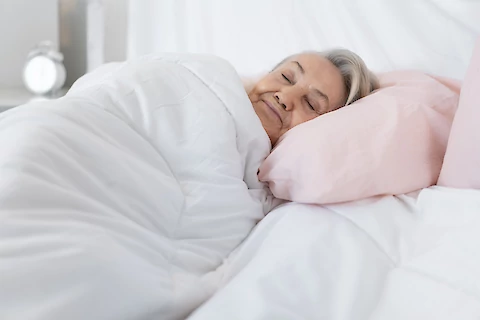
As the seasons shift and temperatures drop, it's not just our wardrobes that need adjusting. For seniors, the colder months can often bring a series of challenges to their sleep patterns, which are essential to maintaining physical and mental well-being. With the right strategies, achieving restful sleep throughout winter is entirely possible.
Today, we'll explore these challenges and offer practical advice, ensuring you or your loved one can stay well-rested during the colder months. Learn how to maintain a consistent, wholesome sleep routine when the mercury falls.
Why Colder Months Can Cause Sleep Disruption
In winter, the days become shorter, and sunlight becomes scarce. For seniors, this decrease in light can disrupt their circadian rhythms—the internal clock that regulates sleep and wakefulness. Chillier nights can also lead to discomfort, making it harder to fall asleep or stay asleep throughout the night. It's important to first understand these challenges to effectively counter them and maintain a healthy sleep schedule.
Create a Cozy Sleep Environment
A key step in ensuring restful sleep during the colder months is creating an inviting sleep environment.
- Select sleepwear made of warm, breathable materials, such as flannel or fleece, can also add a layer of comfort.
- Eliminate unwanted sounds or mask them with a white noise machine.
- Keep the room warm. Recent studies point to an optimal range between 68℉ and 77℉ for seniors' best quality sleep. That's quite a bit higher than previously recommended. Manage your indoor temperature by setting your thermostat within this range.
- Provide soft bedding, and avoid electric heat pads that can cause serious burns.
Maintain a Consistent Sleep Schedule
Maintaining a regular sleep-wake schedule can be instrumental in promoting better sleep. Aim for the same bedtime and wake-up time each day, even on weekends. This consistency helps reinforce your body's sleep-wake cycle and can help you fall asleep and stay asleep for the night.
Napping can also be beneficial for some seniors. If you find that you're fatigued during the day, a short nap can help you recharge without disrupting your sleep at night. Just remember to limit your naps to 30 minutes and avoid them late in the afternoon or evening.
Promote Better Sleep Through Lifestyle Choices
Maximize your exposure to natural light during the day. This can help regulate your circadian rhythm and reinforce your body's natural sleep-wake cycle. Even something as simple as sitting near a window and enjoying the sunshine for a few minutes a day can help.
Physical activity is another important aspect of sleep health. Regular exercise can help reduce symptoms of insomnia by increasing the time spent in deep, restorative sleep. Just be sure to finish your workouts at least a few hours before bedtime.
Your diet plays a vital role in sleep health. Consuming a balanced diet can ensure your body gets the nutrients it needs to support healthy sleep patterns. Avoiding large meals, caffeine, and alcohol close to bedtime can also help prevent sleep disruptions.
We're Here to Help
Staying rested during the colder months might seem challenging, but by understanding the factors that disrupt sleep, creating a cozy sleep environment, maintaining a consistent routine, and making healthy lifestyle choices, seniors can enjoy restful sleep all year round.
At Senior Helpers Mesa, we're committed to supporting the health and well-being of seniors in Mesa, Apache Junction, Scottsdale, Fountain Hills, and Cave Creek. We offer a range of services, from companionship to specialized in-home care, tailored to your unique needs. Contact us today to learn more about our comprehensive services.